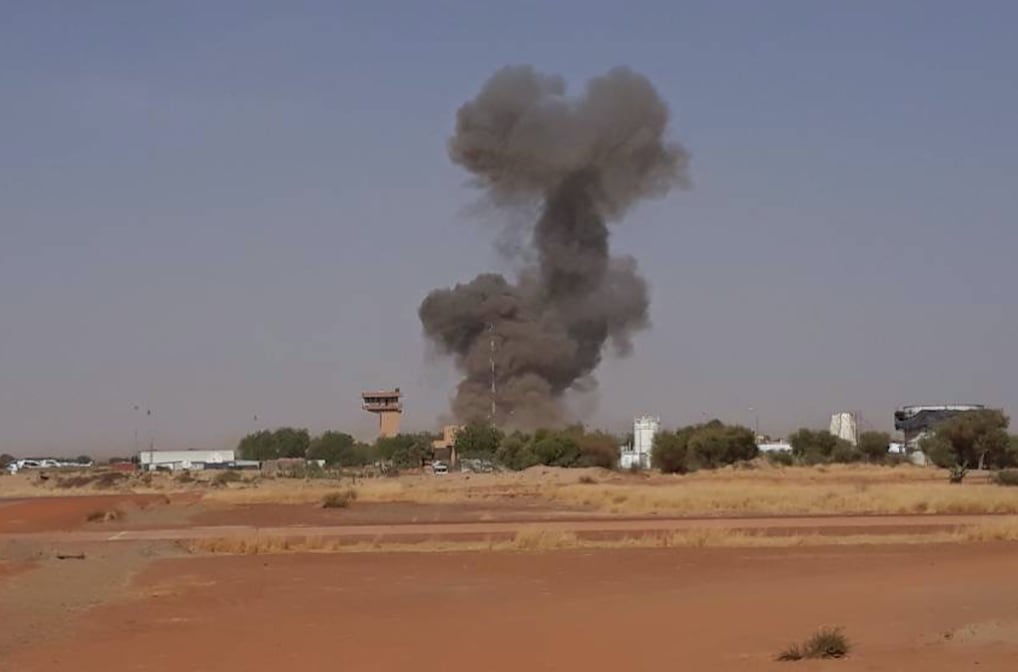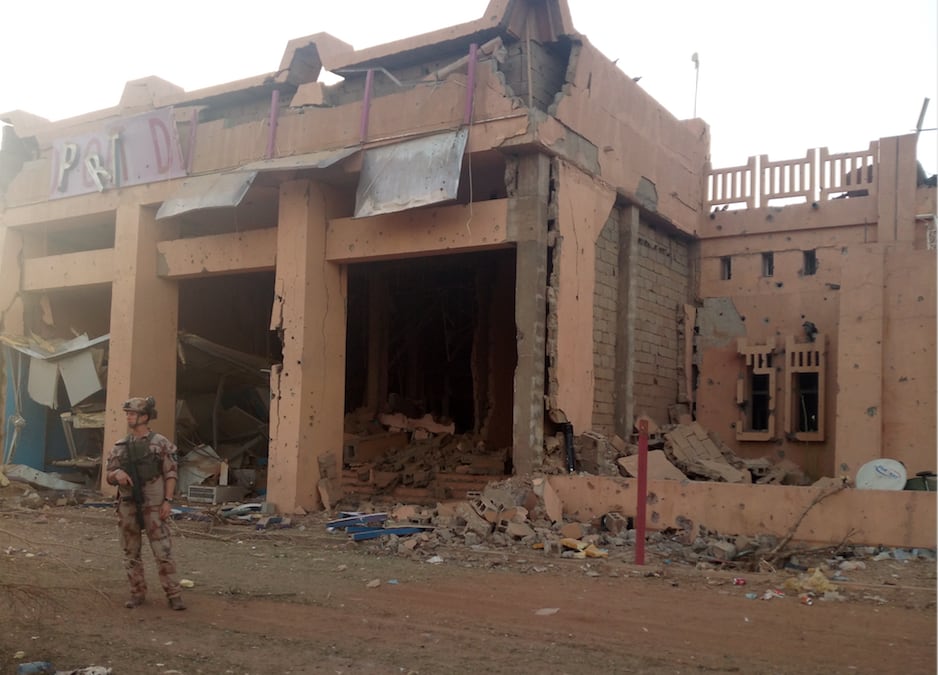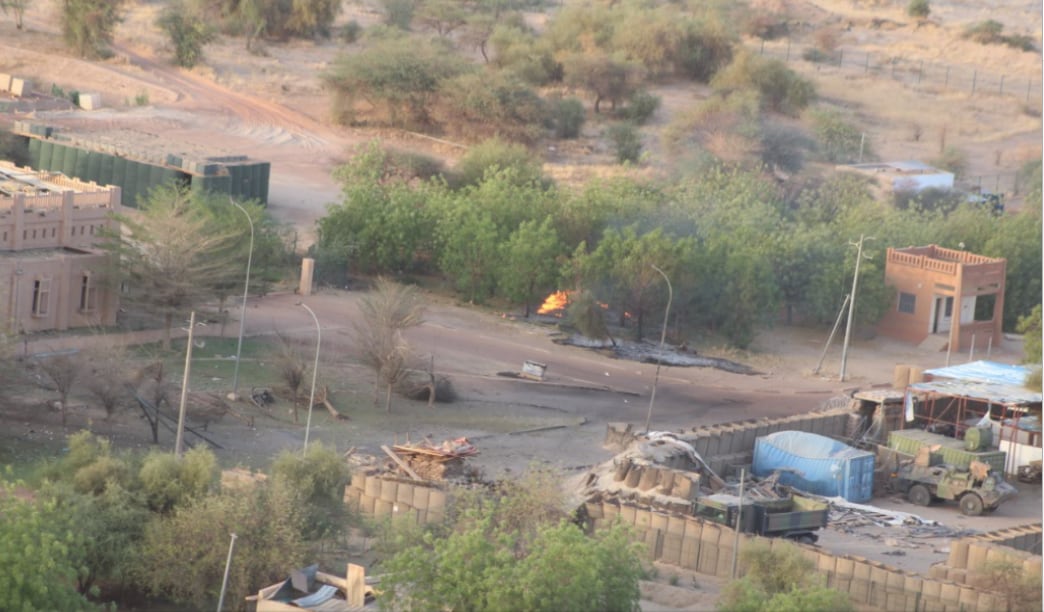The assault started with rockets, mortars and car bombs, before roughly 30 militants disguised in Malian Army and United Nations peacekeeper uniforms breached the perimeter of the U.N. Super Camp near Timbuktu Airport in Mali two years ago.
Four Americans — a sailor, two soldiers and an airman — were pinned down in a bazaar as an alert siren sounded and an opening salvo of mortars peppered the quarter-mile-long camp.
“The severity of this was so, so downplayed,” said a U.S. service member who survived the attack by local al-Qaeda affiliates. “They didn’t want to highlight the fact that there were isolated American forces in the middle of all this who were injured.”
U.S. troops, several of whom agreed to speak on condition of anonymity, were part of the multinational force that repelled the brazen daytime raid by militants inside the U.N. Super Camp on April 14, 2018, according to award documents obtained by Military Times.
Two U.S. soldiers received Purple Heart medals after being injured by a car bomb’s blast wave during the attack. Two others also sustained mild traumatic brain injuries.
Service members said that the politically sensitive nature of African missions, and the fact that some Americans were at risk of capture, may have had a negative influence on the awards process for them. The fact that U.S. troops were present and wounded during the raid has not been previously reported.
The Americans said French soldiers and U.N. peacekeepers from Burkina Faso fought the majority of gun battles to retake the perimeter, but the French compound was lightly manned, as most of them were outside the wire that day.
“There were less than 30 people in the [French side of] camp and they knew that. They attacked at a very opportune time,” said one American. He estimated the attack had been planned well in advance. ”Getting over 6,000 pounds of explosive for VBIEDs, you don’t do that overnight.”
As the assault started, the four U.S. troops broke through a fence to take shelter in a small bunker, ushering in several dozen Malian civilians who were shopping and working at a local bazaar just moments earlier.
The Americans, armed only with 9mm pistols, counted in the civilians and took up guard positions at the entrances of the bunker. Several hundred meters from them, the first car bomb detonated, breaching the outer perimeter of the camp.

Up to that point, they thought a simple mortar attack was unfolding. But even from their bunker, the Americans and Malian civilians felt the force of the first blast wave. One American attempted to make contact with their operations center several hundred meters away using a terrestrial radio, but to no avail.
The Americans contemplated rallying the civilians in their bunker and risking a 100-meter dash to the Task Force Barkhane compound housing French forces. Then they spotted another vehicle close by. It was clearly marked as a Malian Army truck. It drove by them, and then it too detonated. This time, it was less than 100 meters away, destroying the main gate and perimeter to the French camp with the force of a 2,000-pound bomb.
The blast wave rushed into their bunker, knocking those inside down and striking the Americans with debris. The detonation softened the perimeter and jihadi footmen began a ground assault on either side.
While the attack was widely reported in the francophone world, the fact that several U.S. troops were wounded in the melee and activated personal emergency beacons was not. The incident occurred six months after the ambush in neighbouring Niger that took the lives of four U.S. soldiers on a special operations team.
“I didn’t operate in the SOF channels," one service member with multiple Middle East tours who was there said. “I just knew about that one big incident [the Niger ambush] in the news, and then we had our own problem and it was a big problem that didn’t really make the U.S. news for some reason.”
The Americans were part of a military observer group attached to the U.N. mission in Mali. Officials from that command did not respond to a request for comment. Troops assigned to the observer mission are not special operations forces, and their presence highlights the range of dangerous roles across Africa.
Elsewhere on the base, two U.S. service members withstood indirect fire targeting their housing complex, wounding partner nation soldiers next to them. They helped with the casualties before moving to the ops center to organize defenses with a French officer.
Gunfire erupted everywhere following the second car bomb and those inside the bunker could hear insurgents screaming just outside. Two of the Americans spoke French. They told the Malian civilians they were sheltering with to be quiet and stay down as militants armed with assault rifles and suicide vests maneuvered past.

An MD-500 scout helicopter crew from El Salvador was flying over the camp not long after the second car bomb, but they weren’t able to engage. The enemy wore fake U.N. helmets and the pilots couldn’t distinguish friend from foe.
The Americans only briefly left the bunker, low-crawling to place Shout Nanos — handheld emergency beacons — a few feet outside during a lull in fighting. They spent the next three hours waiting for a relief force, with rounds occasionally striking the entryways they guarded.
A marine and airman, along with a French officer, who were at the ops center coordinating defenses managed to enlist an infantry company from Cote D’Ivoire to extract the four Americans and all of the Malian civilians in the bunker.
“Cote D’Ivoire, along with a few civilian U.N. security personnel, showed up in their Russian [amored personnel carriers] to get us out of there and back to the safe side of the camp,” one American said. “I could not have been happier to see them.”
As they were rushed to an armored vehicle, they saw two insurgents’ corpses meters from the bunker.
The attack didn’t fully break for several more hours. Another assault wave tried to breach the U.N. Super Camp’s main gate that night. A soldier from Burkina Faso stopped the car bomb with an RPG round. The premature detonation created a massive crater and caused another militant’s car and several motorcyclists to flee.
French Mirage fighter jets and more French troops arrived later that night to reinforce the U.N. Super Camp and deter further waves. In total, one U.N. peacekeeper was killed, seven were wounded and seven more French troops were also wounded.
Months afterward, footage was released by jihadis of them preparing for the raid with the help of dirt mockups of the camp. They had also raided nearby Malian Army encampments to obtain the trucks and disguises. The timing of the operation was also well-planned. It occurred when most of the French forces were away and on a Saturday — a down day for U.N. forces.
Service members said they had complained about the relaxed security prior to the raid. It was allegedly easy to be hired by the U.N. for custodial labor, both indoors and outdoors, and background checks in war-torn Mali were almost impossible. Workers sometimes even had smartphones with cameras and GPS capabilities.
“One local national was caught rummaging through the trash with a by-name roster of U.N. personally identifiable information in their hands,” a U.S. service member said. “An Egyptian officer caught the exact same person shoulder surfing a U.N. computer terminal that was viewing an upcoming operation. This was reported to U.N. security and they reassigned the dumpster diver to the other side of the Super Camp, still with no supervision.”
Kyle Rempfer was an editor and reporter who has covered combat operations, criminal cases, foreign military assistance and training accidents. Before entering journalism, Kyle served in U.S. Air Force Special Tactics and deployed in 2014 to Paktika Province, Afghanistan, and Baghdad, Iraq.




